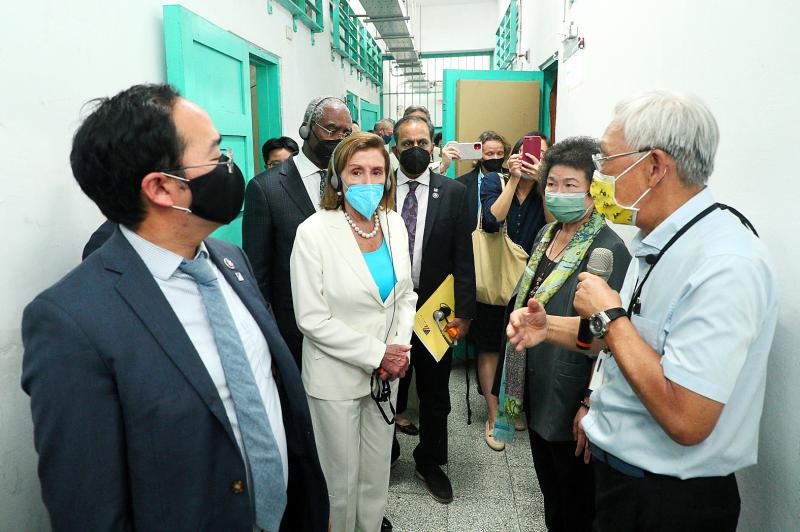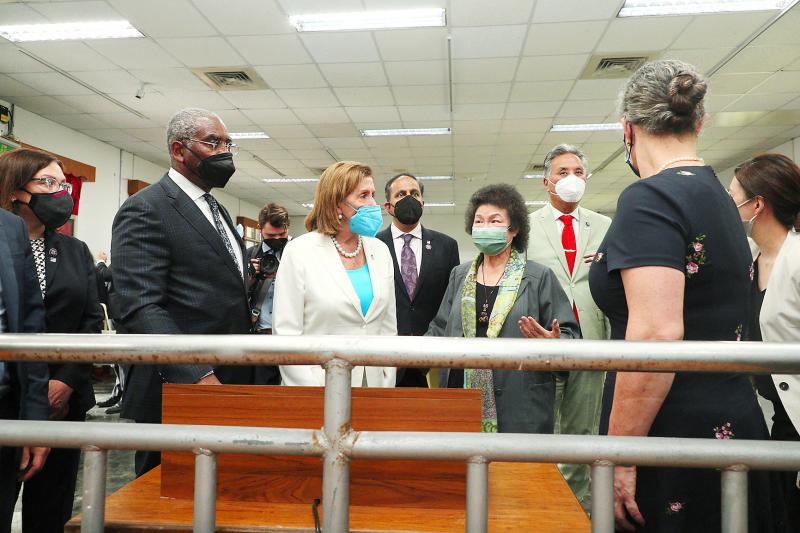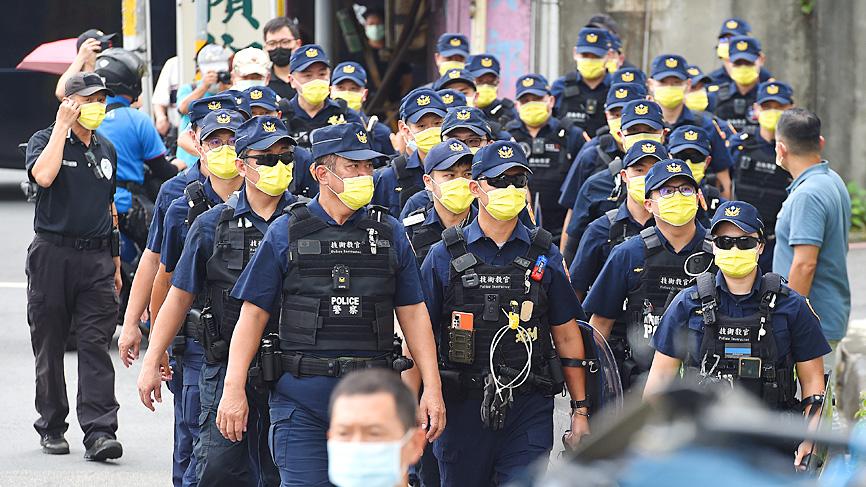US House of Representatives Speaker Nancy Pelosi yesterday met with democracy advocates Wuer Kaixi, Lee Ming-che (李明哲) and Lam Wing-kei (林榮基) at the Jingmei White Terror Memorial Park in New Taipei City’s Sindian District (新店).
Pelosi entered the museum at 2:40pm yesterday while officers from the New Taipei City Police Department’s Special Police Corps remained outside to guard the site.
Lee, who works for a Taiwanese non-governmental organization and was released from prison in China on April 15 after a five-year term, arrived five minutes later.

Photo: Taiwan Ministry of Foreign Affair
Tibetan government-in-exile representative to Taiwan Kelsang Gyaltsen Bawa and Lam, a Hong Kong-born bookseller who migrated to Taiwan after being persecuted by Beijing, arrived at 3pm.
Speaking to reporters before the meeting, Lam said they would discuss human rights in Taiwan, Hong Kong and China.
“Human rights are universal values. It makes no difference where you are from,” he said. “What is important is that Pelosi supports Taiwan. She lets people in Taiwan and Hong Kong feel they are not alone.”

Photo: Taiwan Ministry of Foreign Affairs
Speaking with reporters ahead of the meeting, Wuer Kaixi recalled his first meeting with Pelosi, in 1989, after he fled China for the US to escape looming arrest for his involvement in organizing the protests that were quashed by the Tiananmen Square Massacre.
“When I first arrived in the US, I was deeply impressed by Pelosi, who had just become a representative,” he said.
He said Pelosi helped him and other democracy advocates, adding that she lent a helping hand to anyone who needed assistance arranging a visa or help adapting to life in the US.

Photo: Liao Chen-huei, Taipei Times
“She was very kind and a good friend,” he said. “When I met her in Oslo in 2010, she gave me a big hug and introduced me to her family.”
Wuer Kaixi said he was happy to meet her in the country where he has found refuge, adding that he would tell her “how wonderful Taiwan is.”
He said he felt the US cutting ties with Taiwan was unfair and hoped Pelosi could push for amendments to Taiwan-related US laws.

The High Prosecutors’ Office yesterday withdrew an appeal against the acquittal of a former bank manager 22 years after his death, marking Taiwan’s first instance of prosecutors rendering posthumous justice to a wrongfully convicted defendant. Chu Ching-en (諸慶恩) — formerly a manager at the Taipei branch of BNP Paribas — was in 1999 accused by Weng Mao-chung (翁茂鍾), then-president of Chia Her Industrial Co, of forging a request for a fixed deposit of US$10 million by I-Hwa Industrial Co, a subsidiary of Chia Her, which was used as collateral. Chu was ruled not guilty in the first trial, but was found guilty

DEADLOCK: As the commission is unable to forum a quorum to review license renewal applications, the channel operators are not at fault and can air past their license date The National Communications Commission (NCC) yesterday said that the Public Television Service (PTS) and 36 other television and radio broadcasters could continue airing, despite the commission’s inability to meet a quorum to review their license renewal applications. The licenses of PTS and the other channels are set to expire between this month and June. The National Communications Commission Organization Act (國家通訊傳播委員會組織法) stipulates that the commission must meet the mandated quorum of four to hold a valid meeting. The seven-member commission currently has only three commissioners. “We have informed the channel operators of the progress we have made in reviewing their license renewal applications, and

‘DENIAL DEFENSE’: The US would increase its military presence with uncrewed ships, and submarines, while boosting defense in the Indo-Pacific, a Pete Hegseth memo said The US is reorienting its military strategy to focus primarily on deterring a potential Chinese invasion of Taiwan, a memo signed by US Secretary of Defense Pete Hegseth showed. The memo also called on Taiwan to increase its defense spending. The document, known as the “Interim National Defense Strategic Guidance,” was distributed this month and detailed the national defense plans of US President Donald Trump’s administration, an article in the Washington Post said on Saturday. It outlines how the US can prepare for a potential war with China and defend itself from threats in the “near abroad,” including Greenland and the Panama

Taiwan People’s Party (TPP) Chairman Huang Kuo-chang (黃國昌) yesterday appealed to the authorities to release former Taipei mayor Ko Wen-je (柯文哲) from pretrial detention amid conflicting reports about his health. The TPP at a news conference on Thursday said that Ko should be released to a hospital for treatment, adding that he has blood in his urine and had spells of pain and nausea followed by vomiting over the past three months. Hsieh Yen-yau (謝炎堯), a retired professor of internal medicine and Ko’s former teacher, said that Ko’s symptoms aligned with gallstones, kidney inflammation and potentially dangerous heart conditions. Ko, charged with